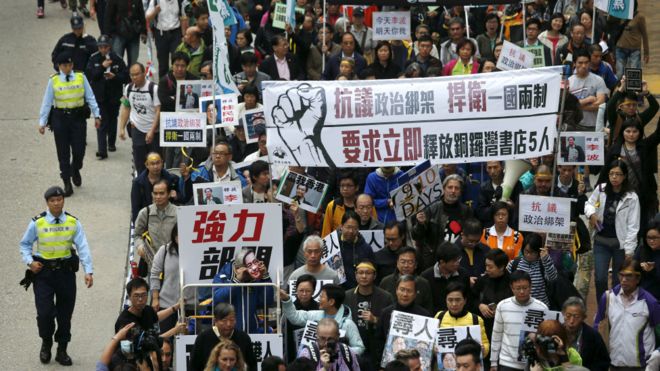New York Times runs pro-China op-ed defending hostile takeover of Hong Kong

(Natural News) On Thursday, October 1, the New York Times ran an op-ed piece defending a plan by the Chinese Communist Party (CCP) to take over Hong Kong, justifying both the recently passed national security law and the violent crackdowns on pro-democracy protests in the special administrative region. Written by Hong Kong Executive Council member Regina Ip, the article argued that the new law is saving the “one country, two systems” government by “ensuring that Hong Kong does not become a danger to China.”
In her article, Ip also criticized the West for its positive portrayal of pro-democracy activists. She described how Western media outlets “glorify these people as defenders of Hong Kong’s freedoms,” but pointed out that pro-democracy figures have caused more harm to the city “by going against its constitutional order and stirring up chaos and dissatisfaction toward our motherland.”
“Something had to be done, and the Chinese authorities did it,” Ip wrote.
The Executive Council member mentioned that she saw “little chance” of compromise between the pro-democracy faction in Hong Kong and the central government in Beijing. Democratic development in Hong Kong has brought about nothing but “chaos, polarization and anti-China sentiment” according to the central government. (Related: Massive protests rock Hong Kong as citizens reject ‘fake democracy’ controlled by communist China.)
Pro-China article draws criticism
The paper’s decision to run Ip’s op-ed drew a fair amount of criticism, with commentators calling the decision to do so dangerous and hypocritical.
Hal Brands, a professor at Johns Hopkins University‘s School of Advanced International Studies, wrote on Twitter: “I wonder if NYT will apologize for running this op-ed, which is clearly so dangerous to the advocates of democracy and autonomy in Hong Kong.”
Meanwhile, Yascha Mounk, an associate professor from the same institution, pointed out that the previous head of the paper stepped down after publishing another controversial piece, but “a propagandist for an authoritarian regime” got a thumbs-up despite arguing that a violent crackdown on pro-democracy protests was necessary.
Mounk was referencing the resignation of former New York Times editor James Bennet back in June. Bennet, who was formerly in charge of the paper’s op-ed section, stepped down after having greenlit a controversial article by Arkansas Sen. Tom Cotton that encouraged the use of force against Black Lives Matter protesters. The associate professor dubbed the paper’s hypocrisy with regards to the opinion pieces as “staggering.”
The running of Ip’s op-ed was not the first instance in which the New York Times kowtowed to the CCP. Previously, the paper ran advertorials by Chinese state-owned broadsheet People’s Daily on its website – advertorials that it eventually took down in August. (Related: NYT quietly scrubs Chinese propaganda.)
“One country, two systems” continually ignored by Beijing
Despite the “one country, two systems” principle in place in Hong Kong, Beijing has continually asserted its control over the island ever since the British returned it. The CCP has imprisoned a number of high-profile supporters of democracy for the special administrative region—including media tycoon Jimmy Lai—as part of its assertion.
According to Ip, the former Chinese leader Deng Xiaoping proposed the “one country, two systems” formula in the late 1970s with the ultimate objective of national unity by bringing back Hong Kong, Macau and Taiwan into a single Chinese nation.
Hong Kong was returned in 1997 after more than 150 years under the British, while the Portuguese returned Macau after more than four centuries. Taiwan, however, has resisted reunification efforts.
Ip wrote that Hong Kong is part of China whether people like it or not, and its progressive integration with the mainland was inevitable given the disparity in size and the special administrative region’s growing economic dependence on the mainland.
She warned that any attempts to change the formal political status of Hong Kong, turn it into a de facto independent political entity or free it from the mainland’s control “is a fundamental challenge to China’s sovereignty.”
Learn more about Hong Kong’s fight for democracy at Freedom.news.
Sources include:



